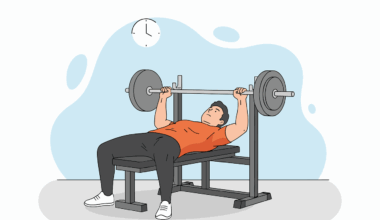The Benefits of Group Fitness Classes in Mental Health Rehabilitation
Group fitness classes offer numerous advantages for those undergoing mental health rehabilitation, emphasizing both physical and mental wellness. One primary benefit is the fostered sense of community. Participants in these group sessions often build strong connections, providing mutual support and understanding. Feeling isolated is common among individuals with mental disorders, but group classes create a supportive environment where participants feel less alone. Furthermore, this camaraderie encourages accountability and motivation, as individuals work towards their fitness goals together. Group settings often culminate in encouraging interactions that enhance self-esteem and self-worth. In addition, regular physical activity has been shown to reduce symptoms of anxiety and depression, significantly aiding mental health recovery. Those engaging in group classes often experience heightened energy levels, improved mood, and reduced stress, contributing to overall emotional balance. The combination of physical movement and social interaction creates a holistic approach to mental health rehabilitation. This synergy can prove pivotal in recovery journeys, inspiring individuals to adopt healthier habits, engage socially, and invest in their wellness. Group fitness classes capitalize on collective energy, enhancing the experience and outcomes for participants.
Various types of group fitness classes cater to different preferences and fitness levels, which is significant in mental health contexts. This variety ensures that everyone, regardless of their physical capabilities, can find an appropriate and enjoyable class. Some popular options include yoga, Zumba, circuit training, and spin classes. Each class offers a unique focus, such as relaxation, toning, or cardiovascular health, appealing to diverse interests. Yoga classes, for instance, emphasize mindfulness and breathing, significantly benefiting individuals managing anxiety or trauma. Zumba, on the other hand, combines fun with physical activity, delivering pleasurable endorphin releases. Circuit training allows participants to build strength and endurance at their own pace, accommodating any specific needs. By providing such versatile offerings, instructors can create inclusive settings encouraging participation. Moreover, this flexibility allows members to switch classes based on mood or personal preference. Engaging in various activities keeps participants motivated and committed. Experimenting with new workouts can also enhance confidence as individuals discover new strengths. As a result, group fitness classes effectively contribute to individualized mental health sessions that are engaging and transformative for all participants.
Improved Emotional Regulation
Group fitness classes also promote better emotional regulation through shared experiences. As individuals engage in physical activity together, they often share stories, laughter, and challenges associated with their journeys. This process helps in developing emotional intelligence, a crucial skill in managing mental health issues. When participants express their feelings in a supportive group, it can trigger further connections and deeper understanding among members. Sharing personal struggles creates a safe space, promoting vulnerability and openness, which fosters emotional expression. Participants learn coping mechanisms from one another, leading to improved resilience and adaptability in situations that may provoke stress or anxiety. Collective workouts enable individuals to witness and learn how others manage their emotional states, amplifying personal growth. Additionally, the endorphin release associated with exercising helps participants experience a positive emotional shift, fostering a sense of achievement and satisfaction. Engaging regularly in these classes can enhance emotional stability, fortifying individuals’ ability to handle life’s challenges. With improved focus and concentration, participants may experience minimized symptoms of their mental disorders, creating a streamlined pathway towards recovery.
Moreover, attending group fitness classes inherently promotes commitment and consistency in one’s wellness routine. Regular attendance reinforces positive habits, certainly crucial in mental health rehabilitation. The community aspect encourages individuals to set goals while holding one another accountable for achieving them, decreasing the likelihood of dropout or lack of motivation. Moreover, the structured nature of group classes provides a predictable environment where individuals can feel secure. This predictability can be particularly beneficial when managing symptoms of anxiety or depression, as participants can anticipate their experiences. Maintaining consistency in attending classes also leads to noticeable improvements in physical fitness, promoting a sense of accomplishment. As participants observe their progress over time, they foster higher self-assurance and improved confidence in their abilities. Consequently, individuals may take on challenges they previously thought impossible. They gain courage to tackle both personal and mental hurdles beyond the fitness class environment. With each accomplishment, no matter how small, individuals find renewed purpose and strength to push through their rehabilitation journey. This commitment underscores the transformative potential group fitness classes hold in promoting long-term mental health recovery.
Enhanced Motivation and Accountability
Another critical benefit of group fitness classes lies in their ability to bolster motivation and accountability among participants. When engaging in physical exercise within a group, individuals often feel more driven to complete their workouts. This increased motivation stems from the shared energy and enthusiasm generated collectively. Participants can see their peers pushing through challenges, which encourages them to do the same. Additionally, group classes often create a sense of competition, sparking a friendly environment conducive to progress. Instructors usually build on this competitive spirit, offering encouragement and positive reinforcement, which fuels motivation further. Furthermore, the community aspect fosters a sense of responsibility toward one another, as individuals become more invested in their group’s success. When participants miss classes, they may feel compelled to rejoin in order not to let fellow group members down, and such dynamics create strong bonds. Consequently, this sense of accountability greatly enhances commitment to personal wellness journeys. By staying accountable to both themselves and their peers, individuals can track their progress over time and celebrate accomplishments, fostering an intrinsic desire for personal development and healing.
Additionally, group fitness classes contribute positively to overall physical health, which plays a crucial role in mental health rehabilitation. Engaging in regular exercise improves cardiovascular health, increases strength, and supports mobility. These physical benefits create a sense of well-being that often aligns with improved mental states. As participants cultivate their physical fitness, they may also notice heightened self-esteem, which can counteract negative self-perceptions common in those experiencing mental health conditions. Consistent engagement in group fitness routines also facilitates better sleep patterns, further enhancing mood and emotional health. Quality sleep is essential in any rehabilitation process, as it allows the mind and body to regenerate and recover. The combination of these physical benefits ultimately fosters a sense of balance and stability that is vital for mental health. Participants may discover newfound abilities they never knew they could achieve, further boosting collective group morale. Alongside physical transformations, the holistic aspect of combining fitness with therapy through group classes shapes a comprehensive recovery approach. Individuals learn to value their bodies while nurturing their mental wellness, creating an integrated foundation for sustained growth.
Conclusion
In conclusion, incorporating group fitness classes into mental health rehabilitation offers a multitude of benefits that facilitate recovery and personal growth. These classes cultivate a supportive community that allows individuals to share experiences, struggles, and successes while working towards their fitness goals. The combination of physical activity and shared emotional experiences strengthens bonds and fosters accountability, promoting consistency in wellness routines. Furthermore, participants learn vital emotional regulation skills by observing and engaging with one another, enhancing their capacity to cope with life’s challenges. Improved motivation arises from the group’s energy, while the physical benefits associated with exercise lead to greater self-esteem and an overall sense of well-being. As individuals progress, they build newfound strength, resilience, and a commitment to their healing process. Implementing group fitness classes into mental health recovery strategies creates a holistic approach, merging physical and emotional health, which is essential for long-term success. Such integration is paramount in addressing mental disorders more effectively, paving the way for a healthier, happier future.
As we further embrace this model of rehabilitation, promoting these classes within mental health programs becomes crucial. Striving for a deeper understanding of the connections between physical and mental health can help overcome stigma and foster inclusivity. Rethinking fitness as an essential element of mental well-being ensures that individuals regain control of their health journeys, offering hope and healing through community-driven efforts.


